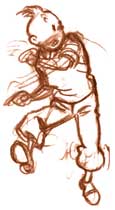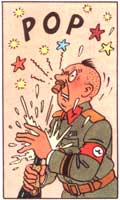In Defence of Hergé

- Image © Hergé/Moulinsart
I'm writing this little pensée in defence of Hergé (the creator of Tintin) because he has been receiving a touch of bad press recently* thanks to the interest in Jan Bucquoy's film 'The Sexual Life Of The Belgians'.
Bucquoy visited this country recently in order to publicise his film ('rather obvious, if saucily entertaining' —Empire) and through interviews revealed that his other claims to fame included cutting off the head of a bust of the Belgian King at the Grand Palace in Brussels, opening a museum of underpants, initiating the Belgian Banana Party and publishing a comic book—The Secret Life Of Hergé—claiming that it highlighted the Tintin creators Nazi collaborationist past.
It is this that has prompted me to defend Hergé, as there are many who presume just because the artist stayed in Brussels and continued to work there while the city was under Nazi control, he was a collaborator. True, his case is not any sunnier for the fact that he worked for Le Soir, a paper controlled by the German invaders, but anyone with any sense can see in Hergé's work what his beliefs were!
Let's go right to one of the most obvious examples—King Ottokar's Sceptre (or Tintin In Syldavia as it was called, originally serialised in Le Petit Vingtième). Events in Europe in 1938 were escalating quickly—in March, Hitler annexed Austria—and many other countries were under threat. 'Sceptre' first appeared in August 1938, and featured the country of Syldavia—a clever composite of Belgium, Czechoslovakia, Yugoslavia and others, under direct threat from the mighty Borduria—an obvious alternative Germany. Its military wore SS style uniforms, their warplanes were modelled on Heinkel aircraft (changed to a Messerschmitt ME-109 in the colour edition) and the subversive 'Iron Guard', a Syldavian political party of fifth columnists (probably mostly Bordurian), using strikingly similair tactics to foreign German sympathisers, were overseen by the right-wing Musstler (an amalgam of Mussolini and Hitler). Of course the Bordurians were cast as the baddies! To further illustrate Hergé's wartime feelings—his other children's characters, Quick and Flupke were shown directly ridiculing Adolf Hitler, shown as a funny chap with a little moustache and a pathetic figure of fun. After the war, with the discovery of the concentration camps, Hergé removed all mention of Hitler from Quick and Flupke reprints—he was no longer funny, just disgusting.
The Tintin creator's next book was The Land Of Black Gold, in which Tintin's own country is on the verge of war. It features a plot by the enemy to blow up the allied force's oil supply, masterminded by the villain, Muller—leaving no doubt concerning his country of origin. Actually this book was interrupted by the German invasion of Brussels, and Hergé, who was on sick leave from the army (with a plague of boils!) took the advice of friends and fled to Paris, along with thousands of other Belgians. But he was still very loyal to his home country, and when King Léopold III appealed for a return to work, and to stay with Belgium through thick and thin, Hergé made the courageous decision to return. Here, thanks to a friend, he was able to continue his Tintin stories on the magazine Le Soir, which of course, as were all press, controlled by the Occupiers. But he did not continue Black Gold (due to it's war theme), he started a new story (The Crab With The Golden Claws) which contained no political leanings at all—every story Hergé wrote and drew during the occupation was strictly escapist adventure (and he excelled at it during this period). The Nazis had obviously failed to see themselves satirised in 'Sceptre' and 'Black Gold', and if Hergé had any sympathy with the Germans, their ideas would have more than likely come out in his war-time work. Also during this time, importantly, he refused the Gestapo's offer to become an informant, and he also refused the Belgian Fascist Movement's offer to become their official illustrator—a brave move when either one of these groups could have him thrown in jail, or worse.
So, throughout the war he worked, creating some of his best adventure tales, including The Secret Of The Unicorn and Red Rackham's Treasure, but in September 1944, while halfway through The Seven Crystal Balls, the allies liberated Brussels, the German's fled, and anyone who had worked for the Nazi press under the occupation was banned from working. Hergé was arrested as a traitor and thrown into jail, he was disgraced and unemployable, he was arrested three more times by various resistance groups. King Leoplod was exiled for similar reasons—sticking with Belgium under the Nazi regime—all they wanted was for their country to go on as normal as possible under these difficult circumstances, and in fact, later, Hergé and the King became great friends due to their common unjustified outcasting. Tintin was not to continue for another two years—but Hergé couldn't remain idle. With his creative partner, Edgar Jacobs, they drew stories under the pseudonym of Olav, and they also kept themselves busy by reworking and colouring some of the old Tintin books.
Hergé's detractors don't have much to go on in the way of evidence that he was a Nazi collaborator. He worked for Le Soir, but this was due to his loyalty to Belgium, his drive to continue work, and to help provide an entertaining distraction for his readers while under an oppressive regime. Other claims lie in the nationality of some of his characters. In The Shooting Star, the scientist team that goes in search of a fallen meteor consists of members all from neutral or axis countries—a Belgian, a Frenchmen, a German, a Spaniard, a Swede and a Portuguese... but they 'forget' that there were only two countries left in Europe by 1941 that were not either neutral or occupied—Russia and Britain (and Captain Haddock was a Briton!). The bad guys in the Shooting Star are American businessmen, and even worse they are headed by a fat financier with a Jewish name. The name was originally to be Blumenstein—what Hergé thought of as a typical American name, until someone pointed out it was in fact Jewish. Relieved to have caught it in time, he changed it to Bohlwinkel (after a Brussels pastry shop)—unfortunately he found out after it was printed that this too was a common Jewish name—something that has pleased Hergé's wartime critics no end. In 1954, Tintin's American publishers insisted that the antagonists of the adventure were changed from being Americans, and he complied and came up with the fictitious Såo Rico, though Bohlwinkel remained. A similar thing has happened more recently with the reprinting of Tintin's second ever adventure—Tintin In The Congo—it has been criticised for it's portrayal of Africans. But the story was written in 1930, and all he did was reflect the colonial attitudes of the time—Hergé said himself that he had depicted his Africans according to the bourgeois, paternalistic stereotypes of the period—and that is all he knew at the time.
When it comes down to it, Hergé was a Humanist, something he had in common with another great creative mind of this century—Charlie Chaplin. Chaplin was exiled from America and branded a Communist, which he wasn't—all he was interested in was people, which came out in his characters. Hergé was the same—all human life interested him—it was his work. The nationality of his characters were usually nothing more than a background, but as Tintin became such an international success, some nationalists have taken any villains heralding from their home personally. As Harry Thompson states in his excellent book 'Tintin—Hergé and his Creation' (Sceptre 1991) 'people were queuing up to be offended'.
Hergé's post war bad period was soon lightened up in the form of Raymond Leblanc, a publisher (and wartime resistance fighter) who came up with the idea of starting Tintin Magazine—and this continued where the liberation had left off, with the completion of The Seven Crystal Balls and onto Prisoners Of The Sun and the brilliant Moon books. Thanks to Leblanc's help, Hergé managed to get a 'certificate of good citizenship' but another of his collaborators, Jacques Van Melkebeke, who started as editor of Tintin magazine wasn't so lucky. He was rearrested for having worked during the war and thrown into prison for several months, he had to resign from the new venture. Belgians who worked as machinists, plumbers or bakers and other 'normal jobs' under the Nazi regime were not hounded and arrested, whilst those who worked in the media were hit terribly hard. As it turned out, Hergé did not truly enjoy the idea of the magazine—it took some of his control away, and he felt he didn't get as good a financial deal as possible - but as Leblanc was something of a savior to him, he couldn't protest without sounding ungrateful! Hergé always preferred Casterman, his book publishers, to Leblanc's more confrontational attitude, and in fact, several times the artist disappeared without trace (at one time spending several weeks residing in a Red Indian tent within the grounds of a monastry), and Tintin Magazine had to make up with reprints.

- Image © Hergé/Moulinsart
The last phase of Hergé's career was much happier, he gained complete control over his creation and it even helped him through several rough periods of his life as he exorcised his troubles out onto paper and into his stunning work. Just to look at the character of Tintin you will see Hergé's high moral and humanitarian standards, and it is also easy to see how strongly he felt about these ideas. If you know anything about Hergé you will know that he put everything into his comic strips—and his quiff-haired reporter is merely a reflection of his ideal self (while Captain Haddock is his less perfect side!). Hergé had no Nazi sympathies!
(* In 1995)
Reccommended readings
- Tintin: Hergé & His Creation by Harry Thompson published by Sceptre.
- Entretiens Avec Hergé by Numa Sadoul published by Casterman
- Hergé And Tintin Reporters by Philippe Goddin published by Sundancer.
Thanks
My thanks to Tintinologist.org staff Paul Durdin for his contribution to this article [Updated March 2001].
Text © Garen Ewing. Used by permission. All images © Hergé/Moulinsart.
